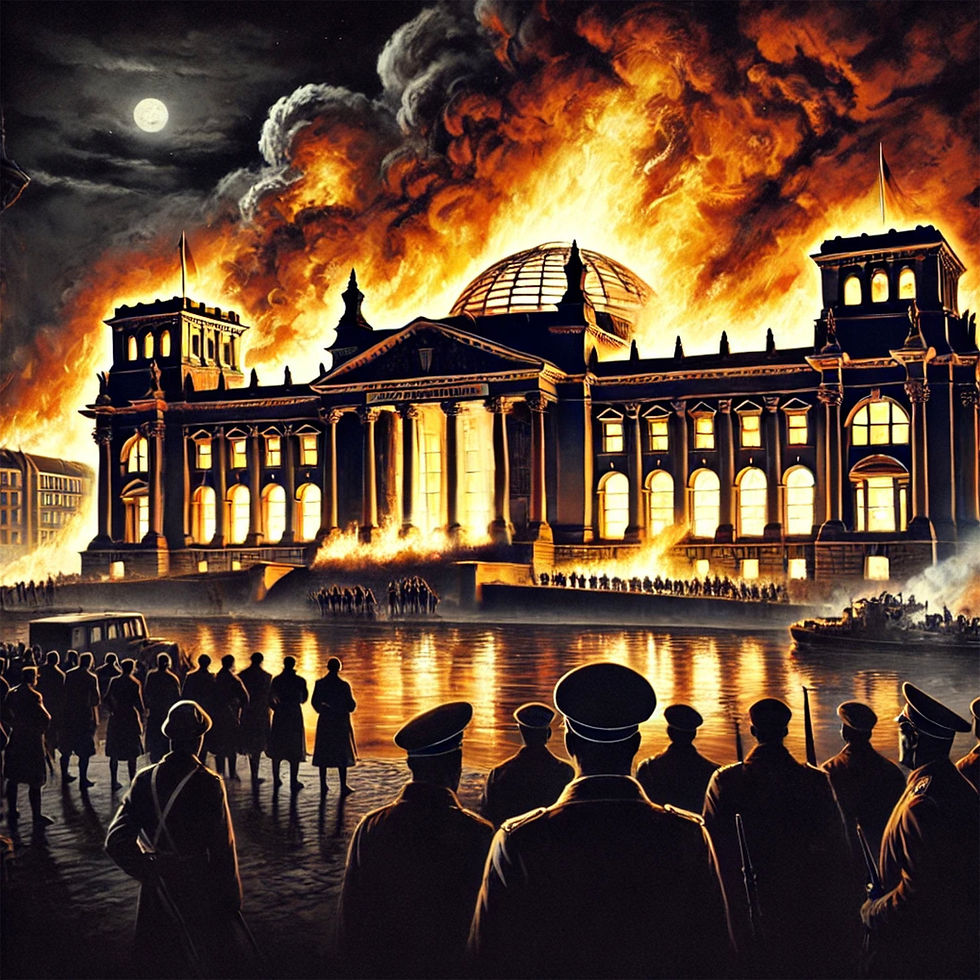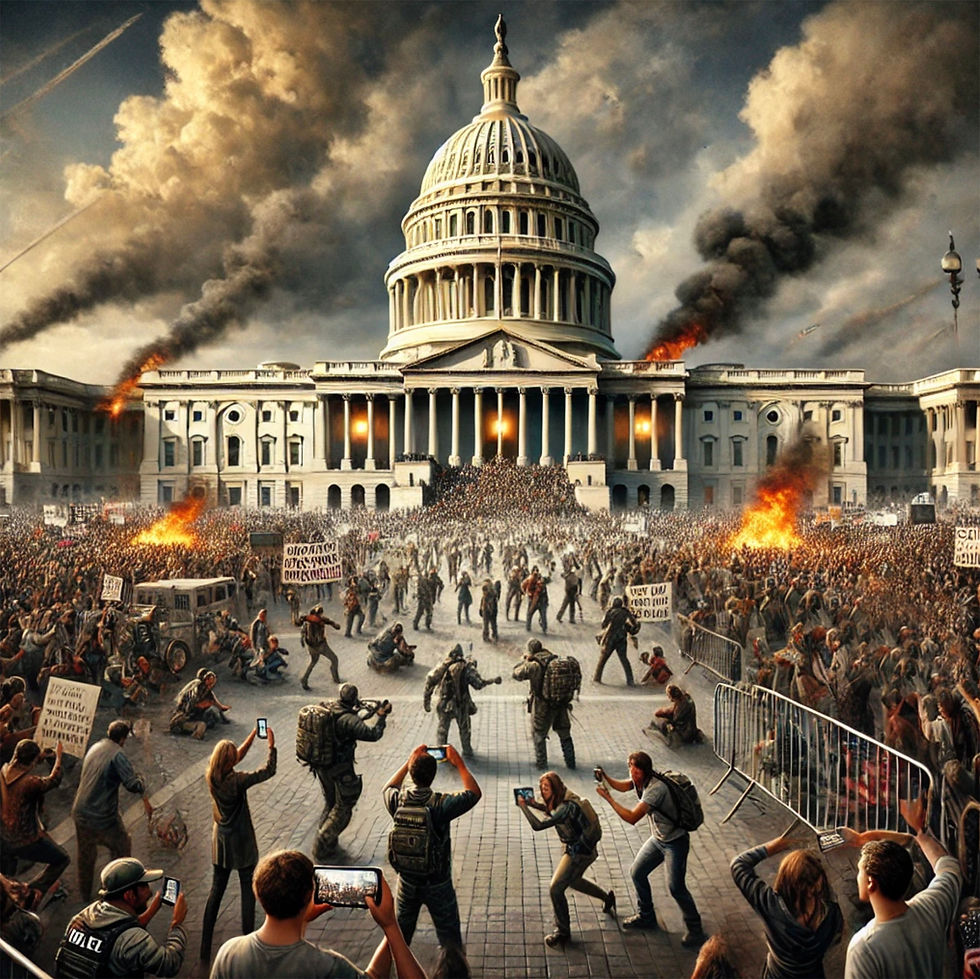The Fragility of Freedom: Lessons from 1933 (#383)
- Rick LeCouteur
- Aug 4, 2025
- 4 min read
Updated: Aug 4, 2025

“To know your future, you must know your past”
George Santayana (1863-1952)
Adolf Hitler’s rapid dismantling of German democracy in 1933 is a chilling case study in how a modern democracy can be undone from within. His rise to power, culminating in a dictatorship within just 53 days of his appointment as Chancellor of Germany, serves as a stark warning of the fragility of democratic institutions.
Hitler Becomes Chancellor
On January 30, 1933, Adolf Hitler was appointed Chancellor of Germany. This event marked the beginning of the Nazi Party’s consolidation of power. Although President Paul von Hindenburg and other conservative politicians believed they could control Hitler and use him to stabilize the nation, they gravely underestimated his ambition and political acumen.
The Decree for the Protection of the German People
On February 4, 1933, Hitler pushed for the Decree for the Protection of the German People. This decree limited the freedom of the press and the right to assemble, weakening opposition voices. Framed as a temporary measure to protect public order, it was a critical first step in undermining democratic freedoms.
The Reichstag Fire
The pivotal event came on February 27, 1933, when the Reichstag, Germany’s parliamentary building, was set ablaze. The Nazi leadership blamed a young Dutch communist, Marinus van der Lubbe, for the fire, branding it a communist plot to overthrow the government. Despite evidence suggesting the Nazis may have orchestrated the fire themselves, the event provided a pretext for extreme measures.
The Reichstag Fire Decree
The day after the fire, Hitler convinced President Hindenburg to sign the Decree of the Reich President for the Protection of People and State, also known as the Reichstag Fire Decree. This decree suspended key civil liberties, including freedom of speech, assembly, and privacy.
It also allowed the government to detain opponents without trial.
Overnight, Germany transformed into a police state, with the Nazis using the decree to arrest thousands of communists and socialists.
The Reichstag Elections
Elections held on March 5, 1933, were neither free nor fair. Nazi-controlled police forces and paramilitary groups intimidated voters and disrupted opposition campaigns. Despite these tactics, the Nazis failed to win an outright majority, securing only 44% of the vote. However, with their coalition partner, the German National People’s Party (DNVP), they gained a parliamentary majority.
The Enabling Act
Hitler’s most decisive move came on March 23, 1933, when he introduced the Enabling Act (Law to Remedy the Distress of People and Reich) to the Reichstag. This law allowed Hitler’s government to enact laws without parliamentary approval, effectively giving him dictatorial powers. To secure the necessary two-thirds majority for the act, the Nazis used intimidation and political maneuvering. Members of the Communist Party, who would have opposed the act, were either imprisoned or in hiding, and the Nazis coerced the remaining deputies into compliance. The Enabling Act passed, cementing Hitler’s control over the German state.
The Aftermath
With the Enabling Act in place, Hitler wasted no time consolidating his power further. Political parties were banned, trade unions dissolved, and opposition leaders imprisoned or executed. By July 1933, Germany was a one-party state under Nazi rule.
Lessons from History
Hitler’s dismantling of democracy in 53 days highlights how authoritarian leaders exploit crises, manipulate laws, and erode democratic institutions.
His rise underscores the importance of vigilance in protecting democratic norms and the rule of law. When leaders are allowed to centralize power unchecked, democracy can be undone with alarming speed.
A Convicted Felon
It is worth noting that Adolf Hitler was a convicted felon when he became Chancellor of Germany in 1933. Hitler and his Nazi Party in 1923 attempted to seize power in Munich through a violent takeover of a beer hall, an event known as the Beer Hall Putsch. The coup failed, and Hitler was arrested and charged with treason. He was convicted and sentenced to prison, where he served less than a year of a five-year sentence. During his imprisonment, Hitler wrote much of his manifesto, Mein Kampf, laying the ideological groundwork for his future rise.
This history underscores the dangerous potential for individuals with authoritarian ambitions to exploit democratic systems, even after being discredited or convicted of serious crimes.
It serves as another reminder of the importance of maintaining vigilance in the face of such threats.
Rick’s Commentary
The rapid erosion of democratic norms in 1933 holds significant relevance in contemporary political discourse. During the current political turmoil, some observers have drawn comparisons to historical examples of democratic backsliding. While the contexts differ, there are parallels worth examining.
For example, consider the current rhetoric about the press, the judiciary, and political adversaries.
Accusations of election interference, calls to delegitimize political rivals, and widespread misinformation campaigns have created a highly polarized political landscape.
This environment fosters mistrust in democratic processes and opens the door for potential erosion of institutional safeguards.
Moreover, the use of executive orders and efforts to expand presidential powers echo historical instances where leaders leveraged legal frameworks to consolidate authority.
While the United States has robust checks and balances, history reminds us that even strong democracies are vulnerable if citizens and institutions fail to remain vigilant.
By reflecting on Hitler’s rise to power, we are reminded of the importance of safeguarding democratic norms, protecting civil liberties, and holding leaders accountable.




Comments